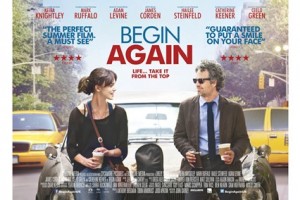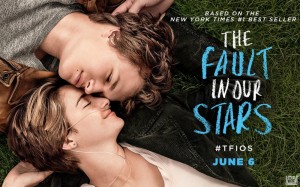Begin Again
Posted on July 1, 2014 at 5:59 pm
B+| Lowest Recommended Age: | High School |
| Profanity: | Some strong language |
| Alcohol/ Drugs: | Drinking, smoking |
| Violence/ Scariness: | Some tense confrontations, slap |
| Diversity Issues: | Diverse characters |
| Date Released to Theaters: | July 2, 2014 |
| Date Released to DVD: | October 27, 2014 |
| Amazon.com ASIN: | B00M7D81FO |
“It’s delicate,” a songwriter tells a performer who has (literally) amped up her gentle ballad into a power anthem.  The songwriter is Greta (Keira Knightly) and the performer (Maroon 5’s Adam Levine) is her ex. They were together for five years when he was struggling, but he has become successful and it went to his head.
The songwriter is Greta (Keira Knightly) and the performer (Maroon 5’s Adam Levine) is her ex. They were together for five years when he was struggling, but he has become successful and it went to his head.
The more important question for us is whether success has gone to the head of writer/director John Carney. Has he overly tricked out the sweet story he told so well in the bittersweet “Once,” now that he has a bigger budget and top-tier actors? Not quite. Has he repeated too much of the original? Almost. But it is still a lovely little dream of a film, an endearing date-night treat.
No one rumples better than Mark Ruffalo, and here he plays the very rumpled Dan, a once-successful record producer and co-founder of a label with the very pressed and present Saul (Yasiin Bey, aka Mos Def). We know he has had some setbacks because he wakes up in a dingy apartment (and then goes right back to bed), but he drives an elegant Jaguar. He’s unreliable. He’s a slob. He has let down everyone in his life, including his ex-wife, Miriam (Catherine Keener), his daughter Violet (Hailee Steinfeld), and his company. Worst of all, he just does not care about any of it any more, partly because he likes to feel that he is a victim and partly because he just does not want to feel anything at all.
Saul fires him (obligatory “Jerry Maguire” joke). Dan has hit bottom. And that is when he sees Greta, who has been reluctantly dragged on stage at an open mic night, and is quietly singing before an indifferent audience. In a moment of piercing beauty, Dan looks over at her and does not just hear but actually sees an arrangement come together around her, as ghostly instruments begin to, yes, delicately, fill in to support her song. She reminds him of what made him excited about music, and he tells her he wants to record her.
Like “Once,” there are scenes of people sharing music, of extemporaneous singing and composing, that light up the characters with so much shimmer it gives us goosebumps. There’s a fairy tale quality to the story. Of course they decide to forego a recording studio and made the album with hit and run session outdoors all over New York City where they run into adorable urchins who provide back-up vocals (and apparently don’t require contracts or royalties or any other pesky little legal details) and finish the tracks before they have to grab the gear and run from the cops.
I wish they had kept the original title for the film, “Can a Song Save Your Life?” It is more apt, more vivid, less safe. Carney is wonderful at evoking the joy of music, its healing powers, and the way it connects us to each other and the universe. This is a love story, not between Dan and Greta or between them and their exes but between humans and music.
Parents should know that this film has constant very strong language, drinking, smoking, and sexual references.
Family discussion: Share your “guilty pleasure” songs with your family. Why did Greta decide to release her music herself?
If you like this, try: “Once,” from the same writer/director




